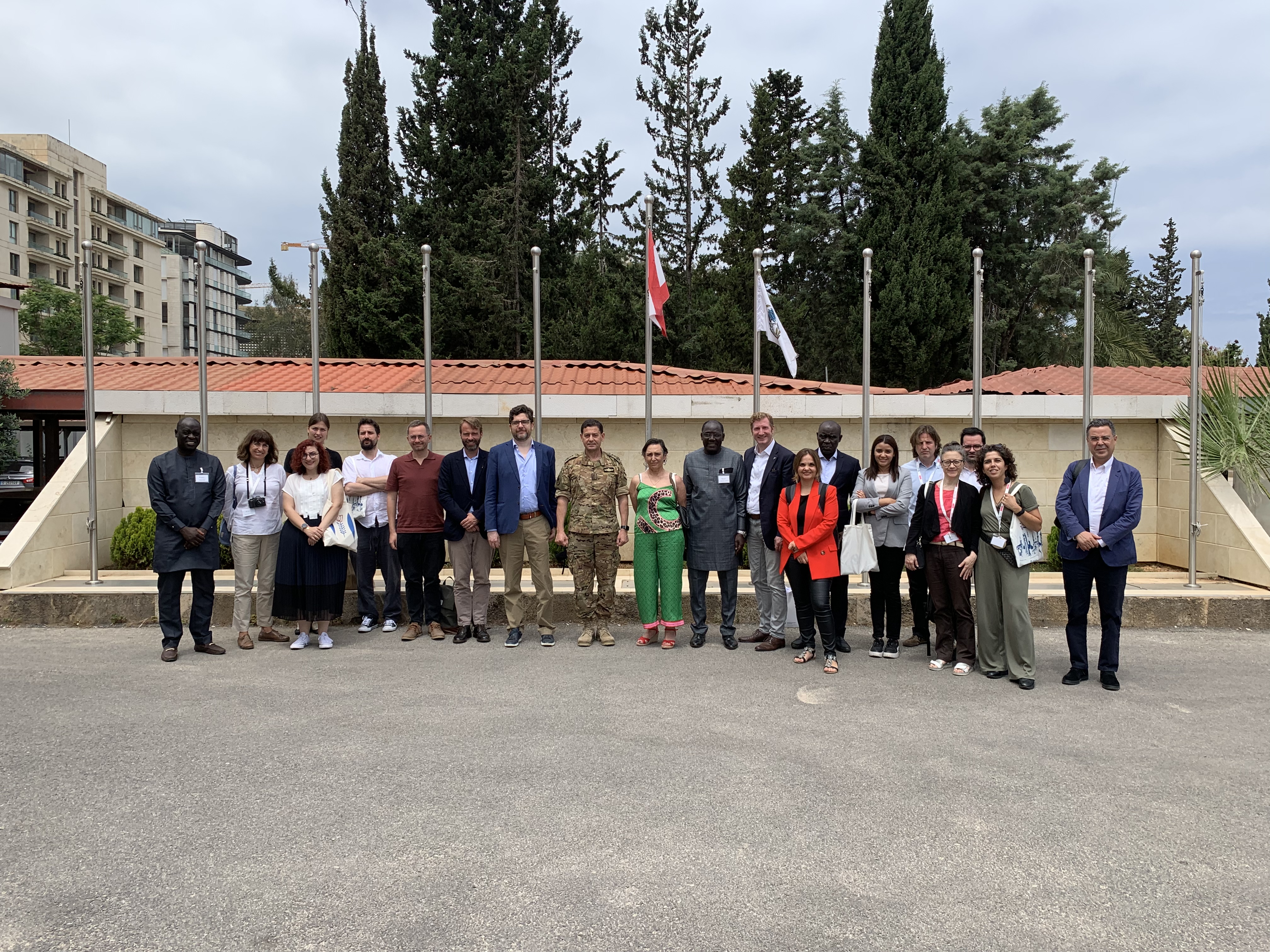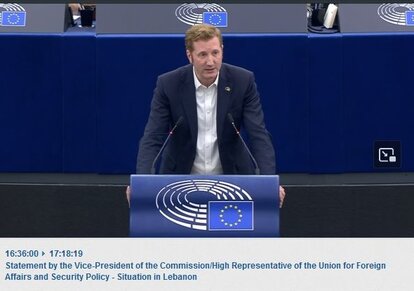Migration trends
The Syrian-Lebanese Migration Puzzle: A new EU approach?

Members of the FNF Madrid Migration Policy Group during the field trip to Lebanon
© FNF MadridThe debate about Syrian refugees, particularly in Lebanon, has shifted these past months. Bashar al-Ásad is back on the international scene, and the re-incorporation of Syria in the Arab League has shown that echoes of peace are now part of the future roadmap for the country. In this vein, some voices argued that it’s time for Syrian refugees to go back home, since stability seems to be a new direction for the country. Moreover, Lebanon, the main host country for Syrian refugees, has been facing one of the worst financial crises of its history.
All in all, the current situation has led to growing concern and has been on the front page of the EU debate. In June, two specific events were held in order to shed light on the current situation: the Ministerial Session of the VII Brussels Conference on the Future of Syria and the Region, and the plenary session on Lebanon.
Aware of the complexity of the migration flows of Syria and Lebanon and its challenges to the EU, the FNF Madrid Migration Policy Group held a visiting program in Lebanon, in May. In the five-day event, liberal policymakers and experts had the opportunity to understand the personal reality of Syrians refugees in Lebanon.
EU approaches to the Syrian refugees’ situation
“It is unacceptable that Syria has been brought so low. It is unacceptable that we tolerate the present plight of the Syrian people. Our task must be to find ways of working positively towards a resolution of the conflict.” claimed the EU High Representative for Foreign Affairs and Security Policy /Vice-President of the European Commission (HR/VP), Josep Borell, in his opening speech at the Ministerial Session of the VII Brussels Conference on the Future of Syria and the Region. Indeed, 12 years have passed since the beginning of the Syrian conflict, one that started with a civil war and delved into a humanitarian and economic crisis.
Life keeps getting more difficult for Syrians within and outside of the country. Hope is disappearing after recent events that have whipped the country`s economy and its people. A clear example of this is the devastating earthquake in the region, which has brought further challenges to the Syrians in the north-west part of the country. 90% of the population of the country is living in poverty and 60% suffer from food insecurity.
Furthermore, a United Nations estimate of June 2022 has stated that the death toll has amounted to more than 306,000 in the last ten-plus years. In early 2022, the civil war had resulted in 6.66 million Syrian Internal Displaced People (IDP), and a figure of 14.6 million people that were in need of humanitarian assistance across the country.
International actors set a roadmap for Syria future
The Brussels Conference addressed urgent humanitarian and resilience issues that are not only affecting Syrians in Syria and neighboring countries, such as Lebanon, but the communities hosting Syrian refugees within the region as well.
The conference consisted of two days: one reserved for dialogue and another for a ministerial conference. The day of dialogue provided an opportunity for different actors and agents – civil society, the diaspora, refugee-hosting countries, and operational partners engaged in the Syria response, the EU, the UN, and the Red Cross, among others – to converse in an interactive platform. During this day the Syrian and international civil society declared their unwavering commitment to building a future Syria. One where peace, human rights and the rule of law are included on the roadmap. Furthermore, it was established that the role played by Syrian women has to be paid special attention to. In the words of HR/VP Borrell, “They must have a seat at the table”.

Jan- Christoph Oetjen, Member of the liberal group Renew Europe (FDP-Germany) during the EU parliament plenary debate on the Lebanese situation.
© JOCThe role of Lebanon: from a host country to a diaspora Nation.
Another one of the main issues at hand regarding neighboring communities hosting Syrian refugees revolves around the Lebanese situation. Lebanon has a population of 5.6 million people, 1.5 million of whom are Syrian refugees. A figure which places the country as the largest recipient of refugee population per capita in the world. Lebanon nowadays has many open fronts: the aforementioned refugee crisis, the massive Port of Beirut explosion in August 2020, its crippled electricity sector, and so on.
In addition, the country is suffering a political and economic crisis. In October 2022, President Michel Aoun`s term expired without a successor appointed to lead the country. This has produced a power vacuum in the Head of State and has left the executive cabinet in the dark, as they do not have the necessary legal power, nor determination to face the ongoing challenges of the country. Consequently, this has generated a situation of political impasse and economic and social deterioration.
Concurrently with the political circumstances, the economic situation is worsening. The successive depreciations of the Lebanese lira have reached historic lows - with losses of up to 15% of its value in one day -, thus, making the living conditions of the population increasingly grim. On March 23, the International Monetary Fund (IMF) warned of the "dangerous crossroads" at which the country finds itself, "without rapid reforms, it will be plunged into a never-ending crisis".
The Lebanese population has assumed that all Syrian refugees are receiving aid in cash even though this is not the reality of the situation. The maximum aid that Syrian refugees get from UNHCR is equivalent to 20 American dollars per person per month. Indeed, UNCHR and World Food Programme (WFP) are only covering for a 43% of the necessities of the refugees. As a consequence of the misunderstanding, tensions between the two groups are increasing, evolving into a Lebanese refusal of Syrians.
This scenario has been compounded by a new reality that has put Lebanon at the center of attention for European policymakers: the dire economic situation has led to an increase in irregular departures by boat towards Europe.
Liberal voices stand up for Human rights defense
Previous to the annual conference, the EU parliament held a plenary debate on the Lebanese situation on June 13th, which Jan Cristoph Oetjen, member of the liberal group Renew Europe (FDP-Germany) had attended. MeP Oetjen is a member of the FNF Madrid Migration Policy Group and took part in the Migration visiting program to Lebanon. Oetjen argued that the reforms demanded by the IMF could not be implemented due to the politicians’ attitude in Lebanon, who, in his own words, “put their own interests before those of the country”.
Furthermore, the political arm of Hezbollah is also an obstacle to the possibility of finding majority. Concerning the situation of Syrian refugees, the MEP stated that “there have always been many Syrians in Lebanon and they have worked there (…) The point is not to bring these Syrians back to Syria, because the men there in particular fear that they will never see their families again, that they will never show up again. We must not allow that, but we must make sure that the people who fled the war continue to be protected. But, of course, we have to help Lebanon support these refugees in their country”. Finally, he asserted the need to give an international signal that Lebanon has the support of the EU.
On June 15th, at the ministerial conference, despite the international community´s pledge of 6.4 billion EUR at the 2022 Conference, the EU High Commissioner grievously admitted that “over the last year there has been little progress towards a resolution of the Syria conflict”, something which in his regard should change. Hopefully, this will be the result with the help of the new pledge of 5.6 billion EUR for 2023 and beyond by the international community. Additionally, international financial institutions and donors have revealed their loaning of up to 4 billion EUR, which makes a total of 9.6 billion EUR in grants and loans. Conversely, following the advice of MeP Oetjen, the HR/VP Borell claimed that “even as needs rise and tensions mount, these states continue to provide generously for nearly seven million Syrian refugees. This is certainly a heavy burden. While supporting refugee-hosting countries in their difficult work, we also need to defuse tensions and avoid the exploitation of the presence of refugees for political ends”.

